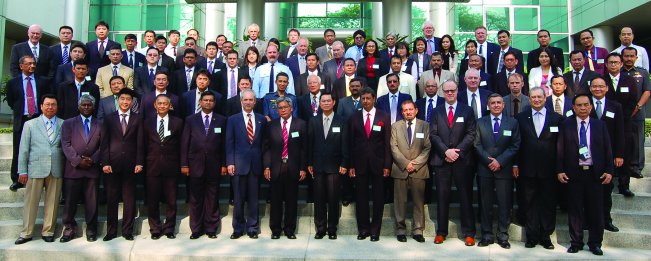The ICAO Asia/Pacific Civil/Military Cooperation Seminar & Workshop took place at the regional headquarters of ICAO in Bangkok, Thailand from 28 February to 1 March 2012. This seminar/workshop had been convened by the International Civil Aviation Organization (ICAO), and had been organized in partnership with the European Organisation for the Safety of Air Navigation (EUROCONTROL), the Federal Aviation Administration (FAA), the International Air Transport Association (IATA), the International Aircraft Owners and Pilots Association (IAOPA), International Federation of Air Line Pilots’ Associations (IFALPA), and UVS International (UVSI).
This seminar/workshop was a Special Implementation Project (SIP) for the Asia/Pacific Regions, and is part of a worldwide campaign of regional civil/military cooperation events recommended by the Global Air Traffic Management Forum on Civil/Military Cooperation (Montreal, October 2009), endorsed by the 37th Assembly (October 2010), which formulated Resolution A37-15, Appendix 0: Coordination and Cooperation of Civil/Military Air Traffic.
The event consisted of a one day high-level seminar and two days of workshops. The event was opened by the ICAO Regional Director and featured keynote addresses by Voradej Harnprasert (Director General of the Department of Civil Aviation, Ministry of Transport, Thailand) and Air Marshal Sujin Chamchoy (Deputy Commander of the Directorate of Air Operations Control, Royal Thai Air Force, Thailand).
The seminar started with a reminder of the outcome of the ICAO Global Civil/military Cooperation Forum, the high-level seminar/workshop programme was presented by Gustavo De Leon (ICAO), an explanation on why the civil and military authorities should cooperate was presented by Roger Rapier (FAA), a message from the Global ATM Forum on Civil/Military Cooperation and the 37th session of the ICAO Assembly was conveyed by Gustavo De Leon (ICAO), and ICAO Circular 330-AN/189 on Civil/Military Cooperation in Air Traffic Management was presented by Carlos Cirilo (IATA).
Thereafter, several presentations by state representatives and panel discussions on civil/military cooperation/coordination developments in the Asia/Pacific region took place: Australian Civil/Military ATM Coordination (Andrew Waye, Airservices Australia & WgCdr Andrew Gilbert, Royal Australian Air Force); Civil/Military Cooperation in India (A.K. Jain & Roshan Kamble, Airports Authority of India); Civil Military Cooperation in Japan (Satoshi Ishimoto & Tomoko Ishikawa, Japan Civil Aviation Bureau); Progress on Thailand’s Civil/Military Cooperation (Nopadol Sang-ngurn, Department of Civil Aviation, Thailand); Civil/Military Cooperation-The Malaysian Experience (V.P.R. Nathan, Department of Civil Aviation); Civil/Military Cooperation – A Regional Perspective (Len Wicks, ICAO Regional Office).
This was followed by presentations by international organizations: Remotely Piloted Aircraft Systems – Status, Needs & Challenges (Peter van Blyenburgh, UVS International); Improving Utilization of Airspace (Capt Nithaar Zain, Singapore Airlines, on behalf of IATA); Civil/Military Cooperation: IFALPA’s Views (Capt Gregory Wolfsheimer, IFALPA).
Subsequently, two panel discussions took place. The first concerned the improvement of collaboration between civil and military organizations, airspace organizations and management, and was moderated by Carlos Cirilo, IATA. The second dealt with interoperability and related challenges and opportunities; it was moderated by Rob Peters, EUROCONTROL.
The workshop consisted of sessions with active participation of all the attendees on the following topics: a) The fundamentals of good communications (guided along by Scott DeHart, FAA, CANSO); b) Preparation of a static airspace plan (presented by Olivier Mrowicki, EUROCONTROL); c) Preparation of a dynamic airspace plan (presented by Olivier Mrowicki, EUROCONTROL). The workshop was concluded by a session on initiatives (including simulation) to improve civil/military cooperation. The LARA simulation was demonstrated by Jan Scholz, EUROCONTROL, and showed what agreed improvement measures can bring.
The event was concluded by the drawing up of consensually agreed on conclusions and recommendations.
This event was attended by 75 civil and military aviation authorities from Australia, Bangaladesh, Cambodia, China, India, Indonesia, Japan, Malaysia, Philippines, Singapore, Sri Lanka, Thailand, USA, as well as representatives of ICAO (headquarters & regional Bangkok, Thailand office) and the 4 following international organizations: IAOPA, IATA, IFALPA, and UVS International.
UVS International is honoured to have been invited to participate in this event and to contribute by highlighting relevant RPAS-related matters to the attendees.

